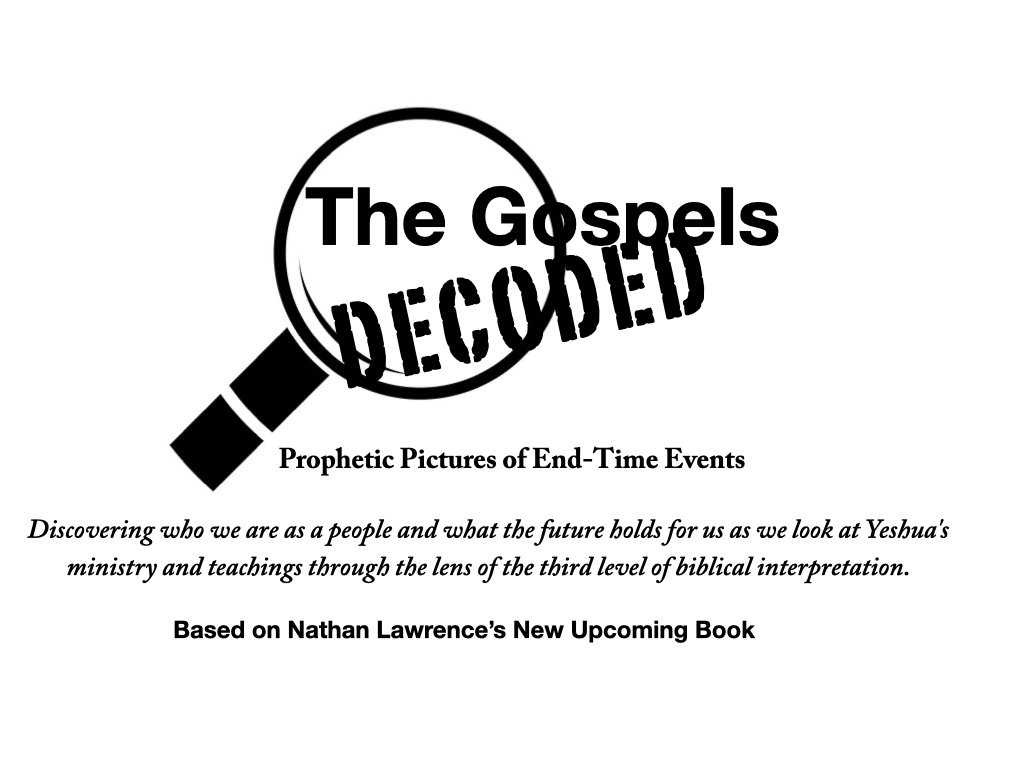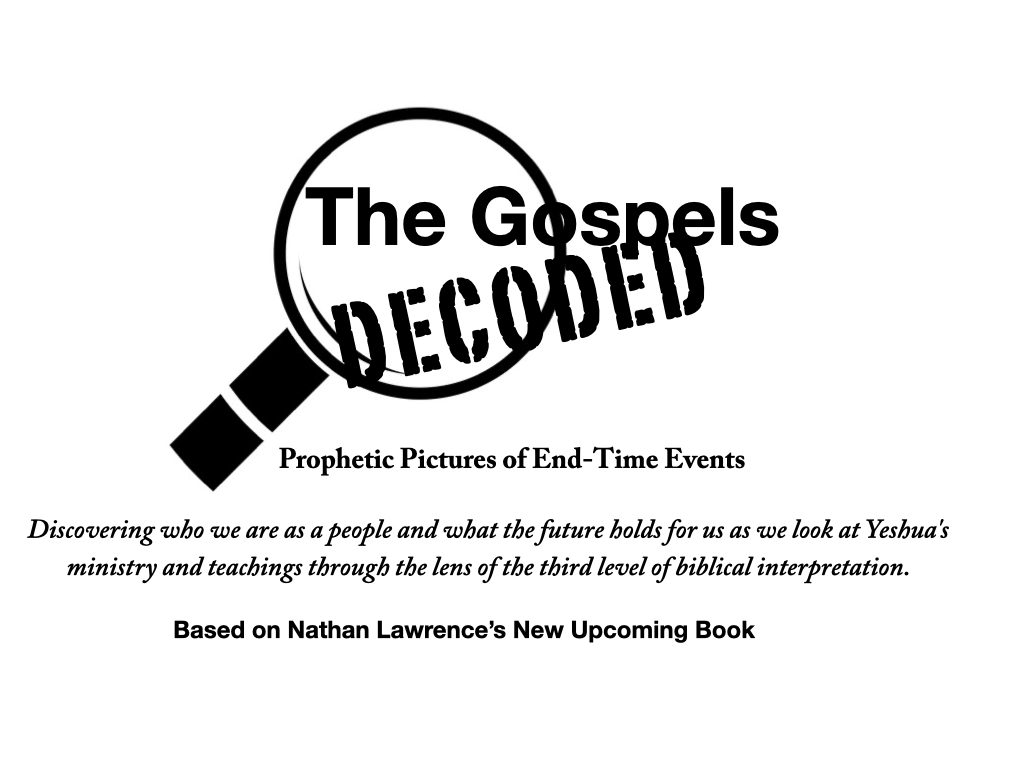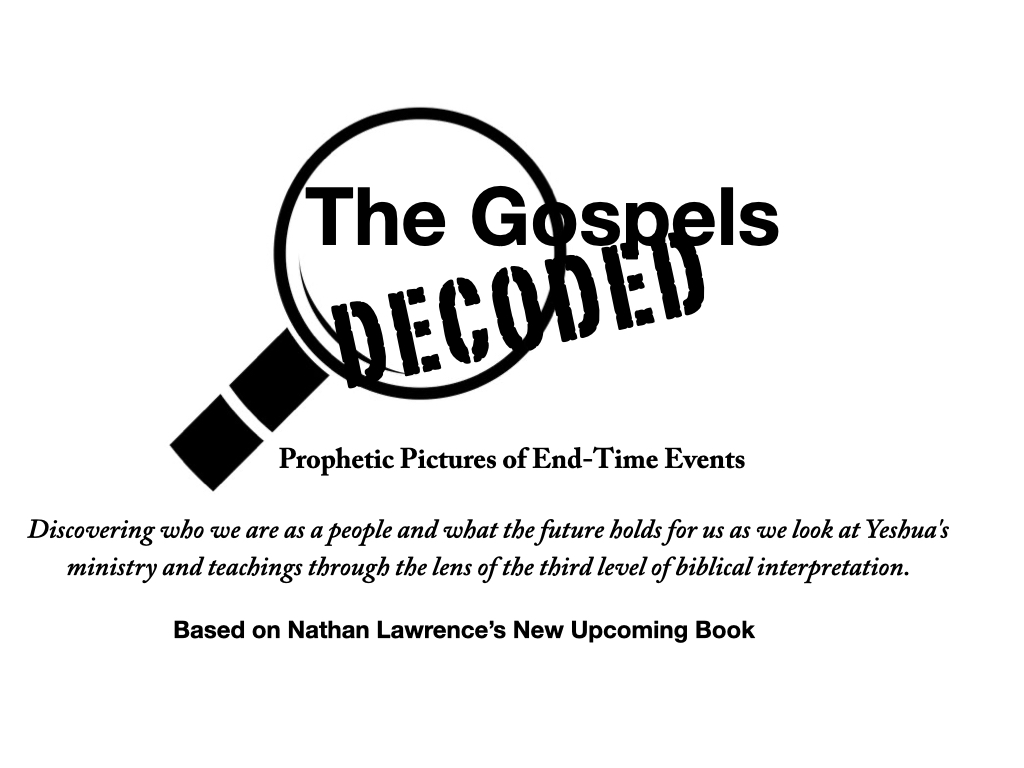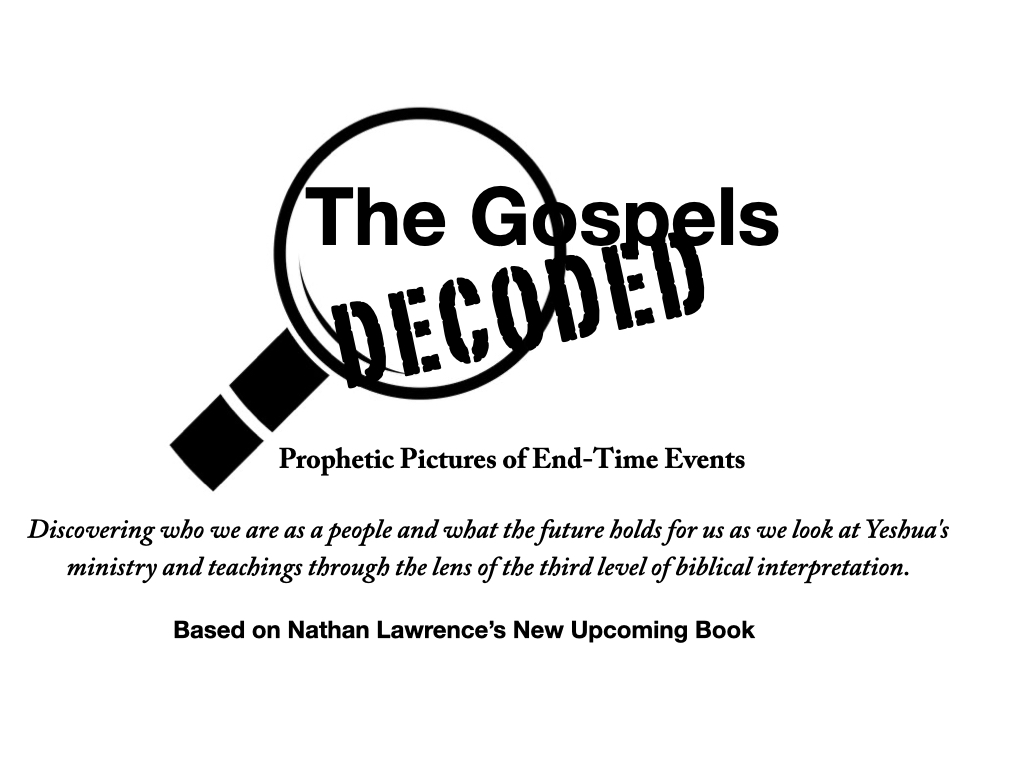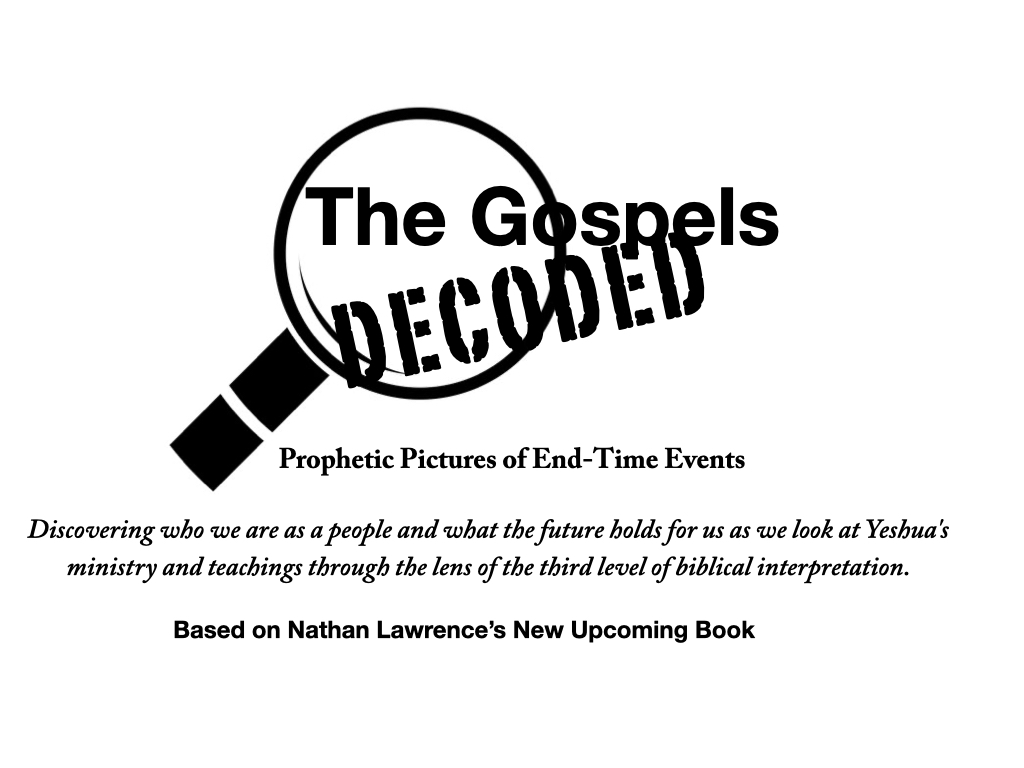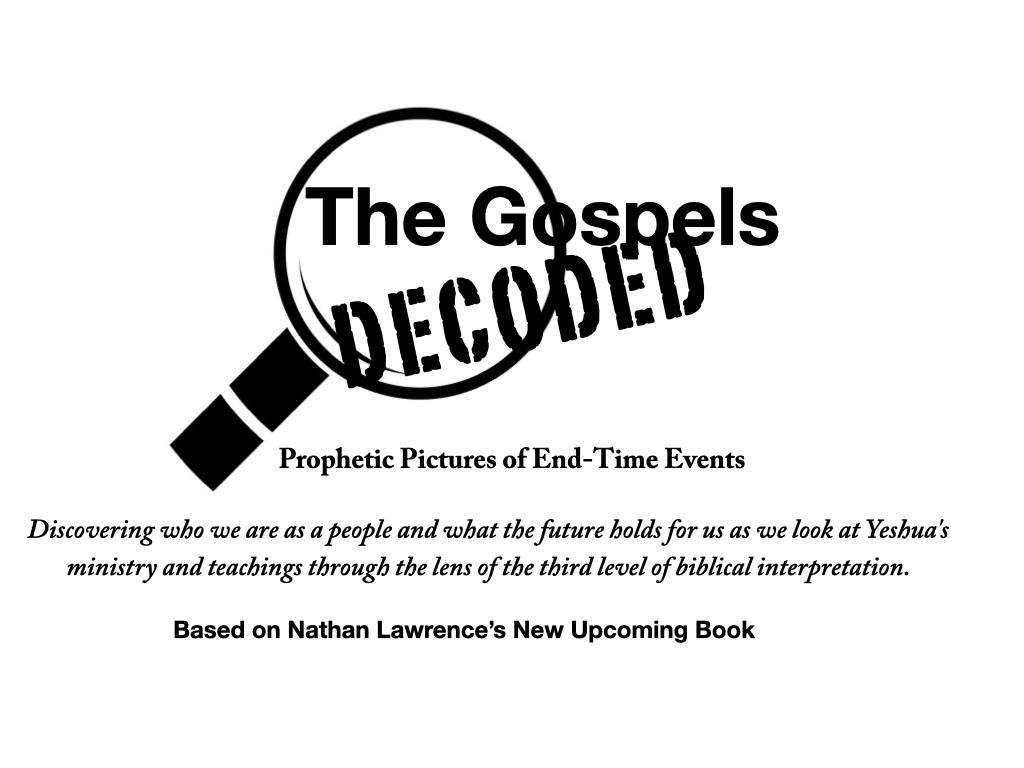
This author believes that the earthly ministry of Yeshua had prophetic implications pertaining to end time events. In other words, I will now attempt to show the reader that behind, if you will, the literal events surrounding Yeshua’s earthly ministry including his miracles and teachings, there was an entire prophetic or allegorical subtext or message. Yeshua’s life was literally a walking prophetic shadow-picture. Understanding these divinely engineered, yet hidden clues from a Hebraic context will yield a literal treasure trove of understanding into end time events as prophetically prefigured in the fall festivals of YHVH.
For the record, let it be known that such a study in no way denies the historicity of the literal events surrounding Yeshua’s life. Both Jewish and Christian scholars have been interpreting literal biblical events in an allegorical light for thousands of years. This is not a new exercise. (For a discussion of this, please refer to our brief study of the Jewish rules of biblical interpretation at the end of this book.) Not only have the biblical exegetes derived understanding from the biblical record through this means of interpretation, but numerous examples can be cited from the apostolic writers themselves interpreting various scriptural passages from the Tanakh (Hebrew Scriptures or Old Testament) in this manner as well.
What is different about the following study is that it will allegorically examine the entire life of Yeshua—his ministry activities, the meaning of the geographical names of the places where he ministered and his parables for the purpose of deriving insights into end time events such as the great tribulation and wrath of Elohim periods, the resurrection, the second coming, the regathering and reunification of the exiled Israelites, the marriage of the Yeshua to his bride and the establishment of his kingdom on earth. It is hoped that the insights gained may clarify some of the difficult passages in the writings of the prophets of the Hebrew Scriptures as well as the prophecies found in the Testimony of Yeshua including the Book of Revelation.
Yeshua’s Compassion on the Scattered Sheep
Matthew 9:35–38, “And Yeshua went about all the cities and villages, teaching in their synagogues, and preaching the gospel of the kingdom, and healing every sickness and every disease among the people. But when he saw the multitudes, he was moved with compassion on them, because they fainted, and were scattered abroad, as sheep having no shepherd. Then said he unto his disciples, ‘The harvest truly is plenteous, but the laborers are few. Pray therefore that the Master of the harvest will send forth laborers into his harvest.’”
Prophetic Points to Analyze
- verse 36, scattered abroad
- verse 36, sheep having no shepherd
Yeshua continued his ministry of healing the shepherdless sheep of the house of Israel and the house of Judah, who had been scattered, hurt, maimed and exploited by hypocritical, self-righteous and self-serving religionists (see Ezek 34).
Yeshua commenced the mission to regather his lost and scattered sheep at his first coming, and his servants continue this mission to this day. At Yeshua’s second coming, he will culminate the work he started 2000 years ago of redeeming and (re)gathering the exiles back to the land of Israel in fulfilment of the land inheritance promises YHVH made to the patriarchs—promises which have yet to be fulfilled to their fullest extent, and which must be fulfilled if the Word of Elohim is true.
The Parable of the Large Net
Matthew 13:47–50, Again, the kingdom of heaven is like unto a net, that was cast into the sea, and gathered of every kind which, when it was full, they drew to shore, and sat down, and gathered the good into vessels, but cast the bad away. So shall it be at the end of the age. The angels shall come forth, and sever the wicked from among the just, and shall cast them into the furnace of fire. There shall be wailing and gnashing of teeth.
Prophetic Points to Analyze
- verse 47, like a net
- verse 47, cast into the sea
- verse 47, gathered every kind
- verse 48, gathered the good…cast the bad away
This is another parable relating to the kingdom of Elohim, and correlates with the concept of Yeshua’s servants being fishermen or, more accurately, fishers of men, seeking lost Israel (the descendants of Ephraim, Manasseh and, by logical extension, the other tribes of the Northern Kingdom as well) whom Scripture likens to fish mixed throughout the sea of humanity (Gen 48:16).
As we have already seen, this understanding corresponds with the rabbinic Jewish interpretation of Genesis 48:16 which says, “may they [Ephraim and Manasseh’s descendants] proliferate abundantly like fish within the land” (The ArtScroll Stone Edition Tanach translation), or as the Aramaic Targum Onkelos translates it, “And like the fish of the sea may they multiply like the children of men on earth.”
The descendants of Ephraim will be mixed in among the nations to become like fish of every sort and kind. As the spiritual net (that is, the message of the gospel) of YHVH is preached to these lost sheep, it will draw up every sort of fish (to mix metaphors). The angels will go forth just prior to the resurrection of the righteous to separate the good fish from the bad, the wheat from the chaff, the righteous from the wicked and the wheat from the tares (see Matt 24:31; 13:30, 37–41, 47–50; cp. 13:24–30). This will be a day of rejoicing for those who are gathered in, a day of anguish for those who are rejected because they failed to heed the gospel message and place their trust and obedient faith in Yeshua the Messiah.
What You Can Do
What are you doing to support the spreading of the gospel, so that the lost sheep of the house of Israel can be brought in? To what degree are you using your divinely-given gifts or talents, as well as the time, treasures and resources heaven has placed at your disposal to be a fisher of men, or to support those who are doing that work? Let us not forget Yeshua’s Parable of the Talents in Matthew 25 where he rewarded the faithful servants, but cast the unprofitable servant into outer darkness.
Yeshua Feeds the Five Thousand
Matthew 14:13–21, “When Yeshua heard of it [about the death of John the Baptist], he departed there by ship [they crossed the Sea of Galilee, John 6:1] into a desert [wilderness] [up into a mountain, John 6:3] [to rest a while, Mark 6:31] place apart. And when the people had heard thereof, they followed him on foot out of the cities. And Yeshua went forth, and saw a great multitude, and was moved with compassion toward them, because they were as sheep not having a shepherd, and he began to teach them many things, Mark 6:33], and he healed their sick. And when it was evening [the day was now far spent, Mark 6:35], his disciples came to him, saying, ‘This is a desert place, and the time is now past; send the multitude away, that they may go into the villages, and buy themselves food.’ But Yeshua said unto them, ‘They need not depart; feed them.’ [“There is a lad here, which has five barley loaves, and two small fishes,” John 6:9] And they said unto him, ‘We have here but five loaves, and two fishes.’ He said, ‘Bring them to me.’ And he commanded the multitude to sit down on the grass, and took the five loaves, and the two fishes, and looking up to heaven, he blessed, and broke, and gave the loaves to his disciples, and the disciples to the multitude. And they did all eat, and were filled [satisfied, fulfilled]: [Yeshua said, “Gather up the fragments that remain, that nothing be lost,” John 6:12] and there was left over of the fragments that remained twelve baskets full. And they that had eaten were about five thousand men, beside women and children.”
Prophetic Points to Analyze
- John 6:1— Sea of Galilee
- Matthew 14:13— by ship
- Matthew 14:13— desert (wilderness)
- Matthew 14:14— great multitude
- Matthew 14:14— moved with compassion
- Matthew 14:14— healed the sick
- Matthew 14:15— evening (the day was far spent)
- Matthew 14:15— buy victuals
- John 6:9— a lad
- Matthew 14:17— five loaves
- Matthew 14:17— two small fishes
- Matthew 14:20— twelve full baskets
This account appears to be an allegory pertaining to end-time events—specifically, the regathering of the Israelite exiles, and is another allusion to the final redemption.
John the Immerser (or Baptist), who came in the spirit of Elijah to prepare the way for Messiah, had just been killed by the politico-religious system of his day. (It is interesting to note that the two end time witnesses or prophets, who will come in the spirit of Elijah, similarly will be martyred in Jerusalem just prior to the return of Yeshua [Rev 11:1–13].) In response to John’s murder at the hands of Herod, Yeshua and his disciples left the area to escape any possible backlash as a result of the wrath of Herod (who symbolically represents the devil). I take this to be a picture of what the Bible prophesies will occur to Yeshua’s bride (the saints) during the great tribulation just prior to his return (Rev 12:12–17). In this scenario, metaphorically the boat in which Yeshua and his disciples were sailing across the sea appears to point to the eagle’s wings of Revelation 12:14 that carried the woman into the wilderness, which is a place of protection and safety the first half of the wrath of Elohim period that is to fall upon the unsaved inhabitants of the earth.
Once in the wilderness, “when the day was far spent…and now the time is far passed” (a prophetic reference to the end of the age just prior to the return of Yeshua), Yeshua fed the multitude five loaves and two fishes provided by a young boy. The five loaves can symbolically represent the five books of YHVH’s Torah or Pentateuch. This is because in Jewish thought the number five represents the Torah, and bread can be a biblical metaphor for the Word of Elohim (Matt 4:4). This points to Yeshua who, spiritually speaking, is the Bread of Life and the Torah-Word of Elohim made flesh (John 1:1, 14; 6:32–58). The two fish is a likely metaphor for the two houses of Israel (i.e., the houses of Judah and Ephraim). This is because, as we have seen before, Scripture likens the sons of Joseph (Ephraim and Manessah) to fish of the sea in Genesis 48:16 (or and who would “proliferate abundantly like fish,” according to The ArtScroll Stone Edition Tanach translation of Gen 48:16). At the same time, as we noted earlier, Yeshua called his disciples to become fishers of men (i.e., Jews, all Israelites and eventually all humans across the face of the earth (Acts 1:8). The fact that a lad provided the makings for the dinner shows us that the Torah-Word of Elohim is neither too difficult for YHVH’s people to understand nor to obey (Deut 30:11–14), for even a child is able to provide this food. Elsewhere Yeshua taught that we must become humble, simple and teachable as little children if we are to enter his spiritual kingdom (Matt 18:2–5).
Yeshua was moved with compassion toward the multitude because they were as sheep without a shepherd. In Ezekiel 34, YHVH rebukes the spiritual shepherds of Israel (i.e., the religious leaders) for not feeding his spiritual sheep,130 for not gathering those who were scattered and lost, and for not healing the wounded and sick. This was the spiritual condition of lost (Ezek 34:16) and scattered (Ezek 34:5) Israel, but YHVH, the Good Shepherd, promises to feed his sheep upon the mountains of Israel (Ezek 34:13–14), even as Yeshua fed the multitudes in the wilderness upon the mountains of Israel by the Sea of Galilee in the historic homeland of the house of Israel (or the Northern Kingdom). He not only fed the multitude, but healed their sick. This he also promised to do for the returning sheep of Israel in Ezekiel 34:4 and 16.
Moreover, Yeshua would not permit the multitudes to return to the villages (symbolic of the churches or religious institutions of the Babylonian world system—out of which YHVH commands his people to come, Rev 18:4) to procure food even though it was becoming evening (or prophetically a reference to the end of the age—a time of spiritual darkness). After all, Yeshua is the Bread of Life (John 6:48–58) and he, as a faithful shepherd, will feed his sheep provender (Ps 23:1–2). He promises to nourish his people in the wilderness during the dark times of the great tribulation just prior to his second coming (Rev 12:14) by feeding Israel from his Torah (pictured by the five loaves).
It is not until one comes away from the villages (a metaphor for the churches or religious systems of this world, which the Scriptures call Babylon or “confusion”[Rev 18:4]) that one becomes truly satisfied and fulfilled with the spiritual nourishment of both the Written Torah-Word and Yeshua the Living Torah-Word of Elohim. In fact, there was such an abundance of food in the wilderness by the hand of Yeshua that twelve baskets of bread were left over.
The number twelve is a symbol of the twelve tribes of Israel, who Yeshua the Good Shepherd will feed once he gathers all his scattered sheep together (Ezek 34:5, 11–16). Twelve also speaks of perfect government. For example, in YHVH’s kingdom the twelve apostles will sit on twelve thrones ruling the twelve tribes of Israel (Matt 19:28). Eventually, only redeemed and glorified Israelites will inhabit the New Jerusalem, which has twelve gates named after the twelve tribes of Israel. There will be no gate labelled “Gentile” (Rev 21:12)! This will be the perfect governmental system of YHVH eternal kingdom.
What You Can Do
Have you left, or are you in the process of leaving Babylonian religious systems, which contain a mixture of biblical truth and pagan and humanistic teachings? This is the time when Yeshua is calling his people out of Babylon (Rev 18:4) and promises to feed and care for them in the wilderness, even as YHVH led the children of Israel out of Egypt and cared for them in the wilderness and prepared them for going into the Promised Land.
In Hebrew, the word wilderness is midbar, which, interestingly, is the Hebrew name for the fourth book of the Bible, the Book of Numbers, which is B’midbar, meaning “in the wilderness.” This word contains the Hebrew word d’bar or debar (also devar), which literally means “word” as in “the word of Elohim”. In fact, the name of the fifth book of the Bible is Deuteronomy is also related to this word. It is the Hebrew word devarim (literally meaning “words” [of Elohim], which is the plural of debar (also devar). Finally, the most set-apart place (or the holy of holies) in the Tabernacle of Moses was alternately called the deveer, which is a Hebrew word meaning “oracle”. It was called this because it was there that Moses went to hear the word of YHVH.
What is the point of this quick word study? Simply this. The Hebrew word for wilderness is related to the Hebrew word for the word of Elohim. What can we learn from this as related to Yeshua feeding the multitudes in the wilderness away from the cities of the Babylonian world system? Sometimes YHVH’s people have to leave the non or quasi-religious (Babylonian) systems of men, and go into the spiritual wilderness to hear the pure and undiluted word of Elohim. This is not easy for many people to do, but in the end times, YHVH is calling more of his people to do just that so that he can purify them spiritually, bring them into alignment with his Word and Spirit (Ezek 20:33–38), and then prepare and train them for their future destiny as leaders in his millennial kingdom in the spiritual Promised Land.


